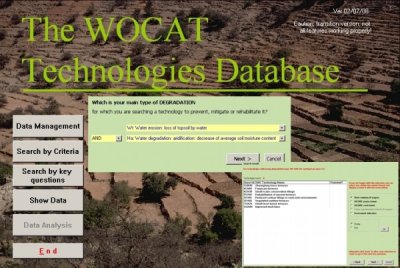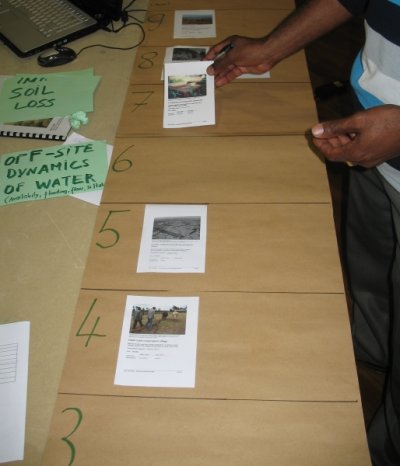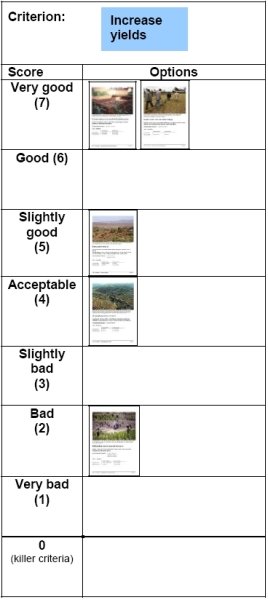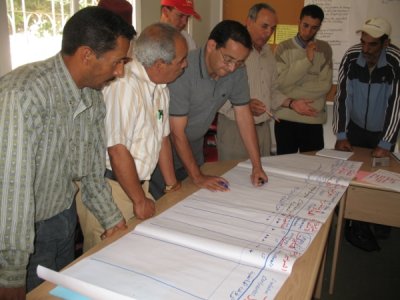|
... in the study sites (Stakeholder Workshop 2).
The workshop methodology consists of three main elements:
- A participatory approach to guide and lead the workshop participants through a process of multi-criteria evaluation of different options which finally results in decision-making on strategies to be field-tested.
- The WOCAT database containing locally applied options as well as options from a number of other contexts.
- ‘Facilitator’, a Multi Objective Decision Support System (MODSS) software to support the single steps of the evaluation and decision-making process.
Target groups were the same as in the 1st workshop: local stakeholders (land users, representatives of local authorities, local NGOs) and external stakeholders (researchers, development professionals, NGOs, GOs).
| Steps |
Objectives |
| Step 1: Review and adjustment of objectives |
- To recall and refresh main discussions and results from the 1st stakeholder workshop.
- To decide on which objectives to focus on for the selection of options that will be implemented later.
|
| Step 2: Identification of options |
- To identify with the help of the WOCAT database a range of options (technologies and approaches) that fit the selected objectives.
- To visualize the potential options.
|
| Step 3: Identification of relevant criteria for evaluation |
- To identify and agree on a set of 9-12 criteria (ecological, economic, and socio-cultural) per objective, relevant for the local context, along which the different options can be evaluated.
|
| Step 4: Scoring the options |
- To assess for each option, to which extent it fulfils the different criteria identified in step 3, i.e. to assess the options by the criteria.
|
| Step 5: Creating a hierarchy and ranking criteria |
- To organise criteria in a hierarchical order.
|
| Step 6: Analysis and interpretation |
- To visualise the relative merits of the different options.
- To interpret the results.
|
| Step 7: Prioritising of options – negotiation and decision making |
- To find a final agreement on which option should be selected for test-implementation in the study site.
|
| Step 8: Embedding into the overall strategy |
- To refine the overall strategy and to ensure that the options selected for test-implementation fits in and framework conditions are considered.
|
| Workshop evaluation |
- To evaluate contents, methodology, and results of the workshop.
|
More details ... the results from each study site of Stakeholder Workshop 2
|
|
»Guadalentín, Spain
»Mação & Góis, Portugal
»Rendina, Italy
»Crete, Greece
»Nestos River Delta, Greece
»Karapinar, Turkey
»Eskisehir, Turkey
»Sehoul, Morocco
|
»Zeuss Koutine, Tunisia
»Dzhanibek, Russia
»Novy, Russia
»Yan River Delta, China
»Boteti, Botswana
»Cointzio, Mexico
»Secano Interior, Chile
»Ribeira Seca, Cape Verde |
|






